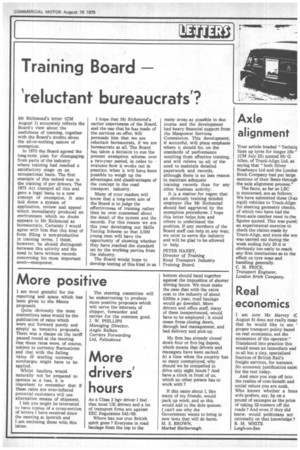Training Board 'reluctant bureaucrats'?
Page 59

If you've noticed an error in this article please click here to report it so we can fix it.
Mr Richmond's letter (CM August 1) accurately reflects the Board's view about the usefulness of training, together with the Board's doubts about the all-or-nothing nature of exemption.
In 1970 the Board agreed the long-term plan for disengaging from parts of the industry where training had reached a satisfactory stage on an occupational basis. The first example of this indeed was in the training of psv drivers. The 1973 Act changed all this and gave a legal basis to a new concept of exemption. It also laid down a system of application, review and appeal which immediately produced an environment which no doubt appears to Mr Richmond as bureaucratic. Certainly I would agree with him that this kind of form filling is non-productive in training terms. I think, 'however, he should distinguish 'between this activity and the need to have written records concerning his most important asset—manpower. I hope that Mr Richmond's earlier experiences of the Board, and the use that he has made of the services on offer, Will persuade him that we are reluctant bureaucrats, if we are bureaucrats at all. The Board has taken a decision to run the present exemption scheme over a two-year period, in order to • evaluate how it works out in practice, when it will have been possible to weigh up the advantages and disadvantages of the concept in the road transport industry.
Many of your readers will know that a long-term aim of the Board is to judge the effectiveness of training rather than be over concerned about the detail of the system and the records. For this reason we are this year developing our Skills Testing Scheme so that 3,000 young 'men will have the opportunity of showing whether they have reached the standard set by the working parties from the industry.
The Board would hope to develop testing of this kind in as many areas as possible in due course and the development had heavy financial support from the Manpower Services Commission. This development, succesful, will place emphasis where it should be, on the standards of performance resulting from effective training, and will relieve us all of the need to maintain detailed paperwork and records, although there is no less reason to maintain adequate training records than for any other business activity.
It is a matter for regret that an obviously training minded employer like Mr Richmond should feel aggrieved by the exemption procedures. I hope this letter helps, him and others to understand the position. If any members of the Board staff can help in any way, we exist to serve the industry and will be glad to be allowed to help.
PETER 'HAXBY, Director of Training Road Transport Industry Training Board.




































































































